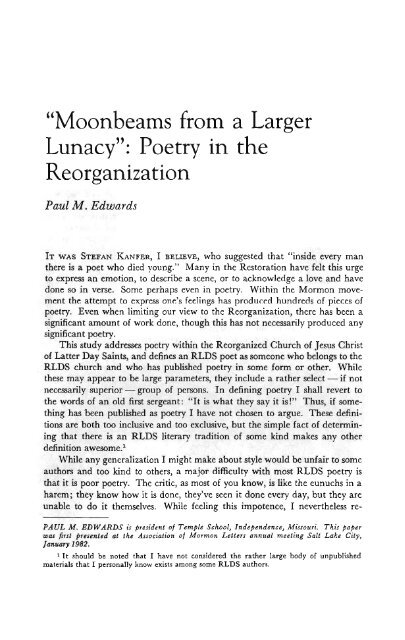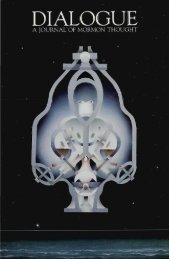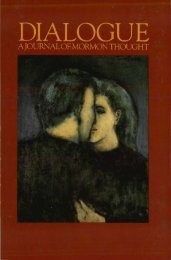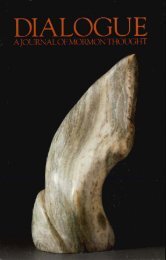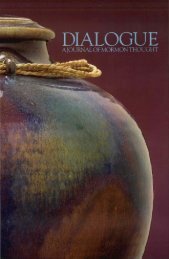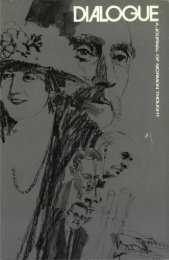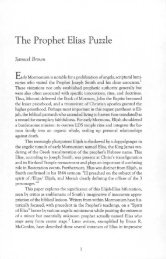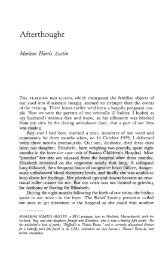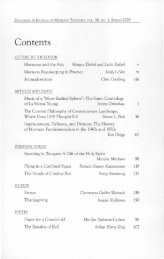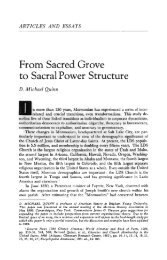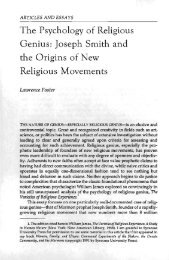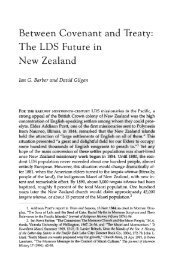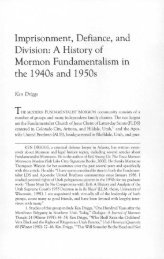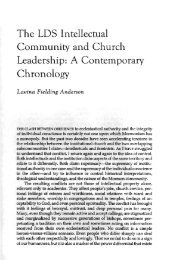Moonbeams from a Larger Lunacy - Dialogue – A Journal of ...
Moonbeams from a Larger Lunacy - Dialogue – A Journal of ...
Moonbeams from a Larger Lunacy - Dialogue – A Journal of ...
Create successful ePaper yourself
Turn your PDF publications into a flip-book with our unique Google optimized e-Paper software.
"<strong>Moonbeams</strong> <strong>from</strong> a <strong>Larger</strong><br />
<strong>Lunacy</strong>": Poetry in the<br />
Reorganization<br />
Paul M. Edwards<br />
IT WAS STEFAN KANFER, I BELIEVE, who suggested that "inside every man<br />
there is a poet who died young." Many in the Restoration have felt this urge<br />
to express an emotion, to describe a scene, or to acknowledge a love and have<br />
done so in verse. Some perhaps even in poetry. Within the Mormon movement<br />
the attempt to express one's feelings has produced hundreds <strong>of</strong> pieces <strong>of</strong><br />
poetry. Even when limiting our view to the Reorganization, there has been a<br />
significant amount <strong>of</strong> work done, though this has not necessarily produced any<br />
significant poetry.<br />
This study addresses poetry within the Reorganized Church <strong>of</strong> Jesus Christ<br />
<strong>of</strong> Latter Day Saints, and defines an RLDS poet as someone who belongs to the<br />
RLDS church and who has published poetry in some form or other. While<br />
these may appear to be large parameters, they include a rather select — if not<br />
necessarily superior — group <strong>of</strong> persons. In defining poetry I shall revert to<br />
the words <strong>of</strong> an old first sergeant: "It is what they say it is!" Thus, if something<br />
has been published as poetry I have not chosen to argue. These definitions<br />
are both too inclusive and too exclusive, but the simple fact <strong>of</strong> determining<br />
that there is an RLDS literary tradition <strong>of</strong> some kind makes any other<br />
definition awesome. 1<br />
While any generalization I might make about style would be unfair to some<br />
authors and too kind to others, a major difficulty with most RLDS poetry is<br />
that it is poor poetry. The critic, as most <strong>of</strong> you know, is like the eunuchs in a<br />
harem; they know how it is done, they've seen it done every day, but they are<br />
unable to do it themselves. While feeling this impotence, I nevertheless re-<br />
PAUL M. EDWARDS is president <strong>of</strong> Temple School, Independence, Missouri. This paper<br />
was first presented at the Association <strong>of</strong> Mormon Letters annual meeting Salt Lake City,<br />
January 1982.<br />
1 It should be noted that I have not considered the rather large body <strong>of</strong> unpublished<br />
materials that I personally know exists among some RLDS authors.
EDWARDS: Poetry in the Reorganization 23<br />
member John Ciardi's definition <strong>of</strong> a bad poem as one that "either misplaces<br />
its human sympathies" or has such gross "technical incompetencies" as to be<br />
unacceptable. Herein lies the problem. Some <strong>of</strong> our poetry is technically well<br />
done, or is at least experimentally interesting. Some makes a significant effort<br />
to deal with the human empathy. But in the main, it has failed to do either.<br />
Most is written in traditional verse forms, <strong>of</strong>ten in syllabic rhyme with<br />
emphasis on visual rather than assonantal schemes, as this poem by Joseph<br />
Dewsnup, Sr., shows:<br />
Help my rejoicing soul to reach<br />
The bliss <strong>of</strong> her supreme desire<br />
To know and tell thy wonderous love<br />
'Tis human hearts with joy shall move.<br />
I feel myself unworthy, Lord<br />
Of thy dear love and sacred trust;<br />
Yet, as thy holy breath and word<br />
called man immortal <strong>from</strong> the dust. 2<br />
RLDS authors, like the majority <strong>of</strong> English-speaking authors, have formalized<br />
the two-ascent foot and produced what is <strong>of</strong>ten an adulterated iambic octameter,<br />
pentameter, tetrameter, or trimeter — <strong>of</strong>ten in the same poem. David<br />
Smith, one <strong>of</strong> the more formal and technically correct <strong>of</strong> the RLDS poets wrote<br />
primarily in iambic octameter as did his son and fellow poet, Elbert A. Smith.<br />
Briefly in the 1940s unmetaphoric forays into Imagism were popular. Most<br />
post-1960 poetry is in iambic octameter, pentameter, or blank verse even<br />
though there have been some experiments in haiku, li, and other specialized<br />
forms. What is <strong>of</strong>ten identified as blank verse by authors and editors is usually<br />
free verse having no meter whatsoever.<br />
False rhyme schemes are quite common and have little <strong>of</strong> the musical quality<br />
that I would prefer. There was (and is) a great respect in the later years for<br />
short pithy poems with very uncomplicated subjects; longer and more complicated<br />
attempts, when found, lack the thematic structure one finds in much<br />
great poetry. There are few attempts at more classical forms; and only occasional<br />
use <strong>of</strong> blank verse with little experimental work <strong>of</strong> the "word jazz"<br />
variety.<br />
The primary exception to these comments appeared during the 1960s in<br />
Stride, a magazine for youth, where some excellent beginning poetry was published.<br />
This medium ceased publication in the 1970s, cutting <strong>of</strong>f an important<br />
outlet.<br />
On the other hand, RLDS poetry does not generally identify with Ciardi's<br />
human sympathies. This may be a case <strong>of</strong> the blackness <strong>of</strong> the kettle irritating<br />
the pot. Yet, I feel words — so <strong>of</strong>ten chosen for the sake <strong>of</strong> the implicit mes-<br />
2 Jasper Dewsnup, Sr., "Prayer," Autumn Leaves 1 (Jan. 1888) : 68.
24 DIALOGUE: A JOURNAL OF MORMON THOUGHT<br />
sage — are without muscle or history and as such stand stark, embarrassed<br />
by their simplicity. Note this 1954 poem <strong>from</strong> Saints' Herald:<br />
There was no chancel for the white-robed choir,<br />
No cushioned pews nor windows <strong>of</strong> stained glass;<br />
But angels sang an anthem <strong>from</strong> the skies<br />
To wondering shepherds seated on the grass.<br />
There was no bassinet with bows <strong>of</strong> blue,<br />
No silken pillow for his small dark head;<br />
But Mary wrapped a king in swaddling clothes<br />
And laid him gently in a manger bed. 3<br />
Words are used both rhetorically, in order to avoid passion; and reflectively,<br />
in order to create relationships between the fact and the image. We limit the<br />
ability <strong>of</strong> the language to speak when the overtones <strong>of</strong> association fail to be<br />
developed by the factual, rather than the intuitional, nature <strong>of</strong> their use.<br />
Symbols in RLDS poetry rarely get beyond their own static presentation to<br />
achieve a new emphasis, particularly when they are measured to fit into lines or<br />
to accomplish a rhyme, and are full <strong>of</strong> weak adverbs and adjectives or, as is<br />
<strong>of</strong>ten the case, completed with accents designed to create instant dialect for the<br />
sake <strong>of</strong> meter. They reflect the tendency to perform in poetry rather than to<br />
relate through it.<br />
Most <strong>of</strong> us use metaphor fairly routinely to define and express our feelings.<br />
Such use creates a bridge between two unlike, yet related, aspects <strong>of</strong> the metaphor<br />
itself. This is the essence <strong>of</strong> what is <strong>of</strong>ten called Platonic love. The tension<br />
created allows us to inject something new into what was understood separately<br />
before, and in doing so, to acknowledge something which was not before.<br />
More than this, the metaphor is a statement about our understanding <strong>of</strong> our<br />
existing world, our immediate environment. It is, as well, the mark <strong>of</strong> our willingness<br />
to venture away <strong>from</strong> the ultimate, the concrete, for (as Ann-Janini<br />
Morey-Gaines states in her beautiful review <strong>of</strong> Gyn/Ecology) "metaphor is the<br />
language <strong>of</strong> invention and process, not finality and ultimate destination. We<br />
rehearse our alternatives in story and myth, and our stories are our conversations<br />
about our choices, not only what we desire but also what we fear; the<br />
things before and the things behind. Without our stories, metaphors are the<br />
critical continuities with which we explore experience." 4<br />
For what is apparent in this attempt to expand on understanding, to go<br />
more than one way at a time in our thinking, is that the point <strong>from</strong> which we<br />
speak metaphorically is over-defined. There is no reaching out in the sense that<br />
3 Berde Rooney, "Royalty," Saints Herald 101 (20 Dec. 1954) : 16.<br />
4 Ann-Janini Morey-Gaines, review <strong>of</strong> Mary Daly, Gyn/Ecology: The Matathesis <strong>of</strong> Radical<br />
Feminism (Boston: Beacon Press, 1978), in Soundings 65 (1982): 340-51. For the<br />
reader interested in the use <strong>of</strong> metaphor as cultural tool this is a very significant article. This<br />
should not overshadow, however, the impact <strong>of</strong> Mary Daly's work on the nature <strong>of</strong> feminism.
EDWARDS: Poetry in the Reorganization 25<br />
Morey-Gaines has suggested; the vast majority <strong>of</strong> our metaphoric usage is<br />
limited to comparison. There is no new comprehension for either the reader or<br />
for the poet, no point at which we can read back into the metaphor a new<br />
understanding <strong>of</strong> the place <strong>from</strong> which we left. Often what we write is superior<br />
verse; but lacking this metaphoric sense, it is not good poetry.<br />
I suspect there are many excellent and practicing poets who will serve as<br />
living pro<strong>of</strong> <strong>of</strong> the limitations <strong>of</strong> my comments. But I accept Paul Valery's<br />
assumption that one line <strong>of</strong> a poem is given to the poet by God, or by nature,<br />
or even by experience, but the rest he/she has to discover alone. Most RLDS<br />
poetry in publication reads as if the authors wanted to write a poem, not that<br />
they had a poem — or a line — to be written. They do not acknowledge the<br />
image before the thought, failing to recognize that in the writing we must live<br />
our "way through the imaged experience <strong>of</strong> all these ideas." 5 Such an experience<br />
in writing poetry requires an abstraction, an imagination. But more than<br />
that, it requires a life-time <strong>of</strong> watching, <strong>of</strong> waiting, <strong>of</strong> seeing normally unseen<br />
things and hearing in the silence <strong>of</strong> one's wondering the words that not only<br />
recall but regenerate the experience. It requires that the poet be the kind <strong>of</strong><br />
person who sees and feels simultaneously so that he/she might think with<br />
his/her body and feel with his/her mind.<br />
Much <strong>of</strong> the poetry <strong>of</strong> the RLDS does not reflect this sort <strong>of</strong> poet. Much <strong>of</strong><br />
the problem can be attributed to the amateur nature <strong>of</strong> both poets and editors.<br />
Every poetic effort appears to be accepted as a valid one. Certainly a poet<br />
must practice, but I am leery <strong>of</strong> the tendency to publish every exercise. These<br />
practice efforts are <strong>of</strong>ten clever, sometimes amusing, and once in awhile edifying<br />
and true. But they leave nothing for the limitless world <strong>of</strong> consideration.<br />
The vast majority <strong>of</strong> published authors within the RLDS tradition have had<br />
fewer than five works published, with the largest percentage having only one.<br />
Thus, many <strong>of</strong> the published works are first poems — <strong>of</strong>ten only poems —<br />
without the selectivity that is brought about by experience, critics, competition,<br />
and a literary tradition.<br />
One reason for this, I believe, is the "presentational nature" <strong>of</strong> what is<br />
written. I refer to the emotional shorthand used to describe an event, recapture<br />
a mood, or celebrate an occasion. Note this response to the opening <strong>of</strong> a<br />
new church building.<br />
A church is more than wood and brick,<br />
block and mortar, steel and stone . . .<br />
they are the shell but not the soul<br />
a church is more than these alone.<br />
Mute walls cannot respond to prayers<br />
<strong>of</strong> dedication; neither can<br />
they take the good news to the world<br />
<strong>of</strong> God's enduring love for man.<br />
5 Paul Valery, The Art <strong>of</strong> Poetry (New York: Vintage Book, 1916), p. 41.
26 DIALOGUE: A JOURNAL OF MORMON THOUGHT<br />
So let this dedication be<br />
<strong>of</strong> mind and sinew, heart and nerve<br />
<strong>of</strong> all who enter — that each one<br />
may come to worship . . . leave to serve. 6<br />
This "light verse turned sober" tends to be very limited in scope, it has as a<br />
theme something pragmatic rather than abstract, it has few if any timeless or<br />
enduring qualities, and more than not it is limited to the existence <strong>of</strong> an emotion,<br />
not a response to the emotion. Often it is simply what Emma Lou Thayne<br />
has called "metered moralizing." 7<br />
Writing prose is <strong>of</strong>ten more testimonial, <strong>of</strong> the prayer meeting variety,<br />
composed <strong>of</strong> an outpouring <strong>of</strong> the warm consideration <strong>of</strong> the grace <strong>of</strong> God and<br />
the love <strong>of</strong> the Saints. But writing poetry is more than testimonial, it involves a<br />
great deal <strong>of</strong> hard work, and it hinges on the author's willingness to risk selfexposure<br />
in an effort to expose the reader. It is hard to read poetry, and I<br />
would venture that most poetry printed by the RLDS is not read, primarily<br />
because it says nothing new and its rewards are not worth the effort <strong>of</strong><br />
understanding.<br />
The other side <strong>of</strong> this, <strong>of</strong> course, is that poets are not used. Many promising<br />
poets whose work appeared at one time in Stride have failed to continue writing,<br />
or at least to submit work for publication. 8 Some have gone on to become<br />
accomplished poets but few either write about, or for, the Reorganization.<br />
This is true in part because neither the reader nor the editors have been able<br />
to grow with the poet's pr<strong>of</strong>essionalism.<br />
Thus there are few RLDS markets for insightful and demanding poetry.<br />
In the first place there are not enough knowledgeable readers to create a demand.<br />
In the second place the market has been greatly restricted by both editorial<br />
and <strong>of</strong>ficial reaction as to what poetry should be. 9 It has not been used<br />
by committed and concerned people, by leaders or dissenters, for inquiry, for<br />
dissent, or for a means to push on the frontiers <strong>of</strong> our beings. Once again we<br />
seem to present poetry to fill empty spaces, not empty hearts and minds.<br />
II<br />
The majority <strong>of</strong> RLDS poetry, particularly since 1900, does not relate to<br />
the Reorganization, the Restoration, or to the institutional church. Certainly<br />
6<br />
Naomi Lou Russell, Discovery: A Collection <strong>of</strong> Poetry (Independence: Russell, 1976),<br />
p. 73.<br />
7<br />
Emma Lou Thayne, "The Chiaroscuro <strong>of</strong> Poetry" in Thomas Alexander, ed., The Mormon<br />
People: Their Character and Tradition, Charles Redd Monographs in Western History<br />
# 10 (Provo: BYU Press, 1980), p. 34.<br />
8<br />
There were a dozen or so showing great promise: Twyla Jones, Gary Wick, Elaine<br />
Cook, Gaye West, Beth Higdon, Vere Jamison (Evan Shute), Pam Lents, Rosemary Yankers,<br />
Barbara Hiles, Billi Jo Maples, and Bruce Koehler, to name but a few.<br />
9<br />
William Russell in his response to this paper in its original form provided an excellent<br />
illustration to this point when he reported that an RLDS poet had sent a poem to the Herald<br />
only to be told by the then-managing editor that it was a good poem, but "can't you write it<br />
in prose?"
EDWARDS: Poetry in the Reorganization 27<br />
it does not characterize the unique nature <strong>of</strong> the movement or any <strong>of</strong> its<br />
peculiar beliefs. For a quick quantitative look at this point I surveyed four<br />
major works in the RLDS tradition and issues <strong>of</strong> Stride <strong>from</strong> 1957 to 1969.<br />
Poetic Voices <strong>of</strong> the Restoration 10 published 244 poems by RLDS authors<br />
covering over ninety years and yet only twenty-one <strong>of</strong> these dealt with distinctively<br />
RLDS topics. In Hesperis, written by the theologically minded David<br />
H. Smith and Elbert A. Smith, 11 fewer than twenty <strong>of</strong> the approximately fifty<br />
poems dealt with the church, its history, or theology. Discovery, a small work<br />
by Naomi Russell, produced only two RLDS verses <strong>of</strong> the forty-eight. In That<br />
Ye Love, 12 a collection <strong>of</strong> works by Evelyn Maples, deals with distinctive RLDS<br />
concepts in only eight or so <strong>of</strong> her ninety-four poems. In Stride, which during<br />
the editorship <strong>of</strong> William D. Russell published a large amount <strong>of</strong> poetry written<br />
by youth, fewer than thirty <strong>of</strong> the more than 150 pieces had anything to do<br />
with the special nature <strong>of</strong> the movement.<br />
I imagine there are many reasons for this, the most obvious being that there<br />
is very little about the RLDS movement distinctly unique, and what there is,<br />
is more historical and scriptural and does not seem to inspire poetic commentary.<br />
This is not to suggest that the Church does not have a significant<br />
heritage and message, but only to point out that it is not being stated in published<br />
poetry. A second reason is the "autobiographical and confessional" nature<br />
<strong>of</strong> our literature. 13 This might be illustrated by the fairly common topic<br />
and style shown in the following poem published in the Herald in 1945.<br />
I chanced to meet a friend one day<br />
As I was going on my way.<br />
In our exchange <strong>of</strong> thoughts and views<br />
I had a chance to speak the news<br />
Of gospel truth brought back to earth<br />
To give to men the soul's rebirth,<br />
To tell him how God speaks once more<br />
Just as he did in days <strong>of</strong> yore;<br />
But no — I just forgot to say<br />
The words I should have said that day. 14<br />
The Mormon movement as a whole is prone to such poetic lapses since the<br />
nature <strong>of</strong> our story is told in the lives <strong>of</strong> those who have sensed the message and<br />
10<br />
Frances Hartman, Poetic Voices <strong>of</strong> the Restoration (Independence: Herald House,<br />
1960).<br />
11<br />
David H. Smith and Elbert A. Smith, Hesperis or Poems by Father and Son (Lamoni,<br />
la.: Herald Publishing House, 1911).<br />
12<br />
Evelyn Maples, In That Ye Love (Independence: Herald Publishing House, 1971).<br />
13<br />
Suggested by Eugene England in his review <strong>of</strong> Richard Cracraft and Neal Lambert,<br />
A Believing People: Literature <strong>of</strong> the Latter-day Saints (Salt Lake City: Bookcraft, 1974) in<br />
BYU Studies 15, no. 3 (1975).<br />
14<br />
Melvin Knussmann, "Last Opportunity," Saints Herald 92 (1 Dec. 1945) : 2.
28 DIALOGUE: A JOURNAL OF MORMON THOUGHT<br />
lived the life. It is easier — perhaps for our purposes better — to explain the<br />
nature <strong>of</strong> the life so affected than it is to try and capture the effect.<br />
One <strong>of</strong> the more enlightening works on Mormon literature is Eugene England's<br />
essay, "The Dawning <strong>of</strong> a Brighter Day." 15 In it he states that most<br />
literature has missed the Mormon view <strong>of</strong> the search for self. While I think the<br />
pragmatic nature <strong>of</strong> this search is far less significant for the RLDS than the<br />
LDS, I would agree with him that the search is most <strong>of</strong>ten an individual one,<br />
<strong>of</strong>ten associated with God but rarely with the institutional church. This may<br />
or may not be a significant factor, but it does explain a good deal about the<br />
lack <strong>of</strong> passion that is found for exemplifying the Church through poetry.<br />
In identifying what this means about our people, however, wisdom suggests<br />
that I be guided by the words <strong>of</strong> David H. Smith, early RLDS leader, who<br />
wrote <strong>of</strong> his craft in "The Poet's Story":<br />
And do not think that he has passed<br />
through every scene he pictures forth<br />
think <strong>of</strong> the poet least and last<br />
and take his song for what 'tis worth. 16<br />
It is my contention that so far the singer is more expressive than the song.<br />
In a second comment made by England, this time in his review <strong>of</strong> Cracr<strong>of</strong>t<br />
and Lambert's A Believing People, he states that America's great literature<br />
"has almost invariably grown out <strong>of</strong> the religious failure <strong>of</strong> a group . . . ."<br />
Thus, he suggests, we ought perhaps to be "pleased to have been spared such<br />
greatness." 17 Surely he writes in jest. There is always a chance that the LDS<br />
may have missed such problems; but in the RLDS, failure is not unknown, we<br />
are not pleased by our inability to find expression in poetry, nor — as he suggests<br />
for the LDS — have we "been too busy doing more important things." 18<br />
If he is even reasonably serious, then I feel he has miscalculated the significance<br />
<strong>of</strong> poetry in the religious expressions <strong>of</strong> a people. I would think this would be<br />
even more true within the LDS tradition because <strong>of</strong> its uniqueness, while the<br />
RLDS find some <strong>of</strong> their literary expression in the larger and less unique field<br />
<strong>of</strong> Christian and Protestant literature.<br />
Whatever the reason, however, it is observable that RLDS poetry — either<br />
<strong>of</strong>ficially or privately published — has, as a rule, not reflected the doctrine,<br />
theology, or history <strong>of</strong> the movement.<br />
Ill<br />
At the risk <strong>of</strong> sounding overly dramatic let me suggest that the poetry <strong>of</strong><br />
the RLDS tradition is too free <strong>from</strong> discomfort and/or joy. I am reluctant to<br />
15 Eugene England, "The Dawning <strong>of</strong> a Brighter Day: Mormon Literature after 150<br />
years," BYU Studies 22 (Spring 1982) : 131.<br />
16 David H. Smith, Hesperis, p. 99.<br />
17 England, A Believing People, p. 365.<br />
18 Ibid., p. 367.
EDWARDS: Poetry in the Reorganization 29<br />
use the word tragedy, as some suggest, and I do not want to argue that poetry<br />
is only born out <strong>of</strong> the pain <strong>of</strong> human existence. There is a point at which<br />
a people, however, have been blessed (or damned) with an abundance <strong>of</strong><br />
mediocrity. We have not had the advantage <strong>of</strong> harassment, for relatively small<br />
attacks have befallen the Reorganization; we have not had the advantage <strong>of</strong><br />
wilderness, for it is our effort which has placed us in the mainstream <strong>of</strong> Christianity<br />
; we have suffered neither isolation nor persecution as did our forefathers<br />
in the Restoration. We have not even had the advantages that our Utah friends<br />
had <strong>of</strong> exile, for we rarely separate ourselves physically or psychologically <strong>from</strong><br />
midlands America that is our home. And few great periods <strong>of</strong> joy, limited<br />
mountain-top experiences, or contemporary miracles are around to inspire.<br />
Lack <strong>of</strong> institutional awareness <strong>of</strong> either the joy or pain <strong>of</strong> humankind<br />
leaves us unrepresentative <strong>of</strong> the people to whom we speak. Not that we have<br />
not ourselves suffered our own personal difficulties or that in the framework <strong>of</strong><br />
the church we do not feel broken and alone, but there is no continuing institutional<br />
assumption <strong>of</strong> the essential nature <strong>of</strong> human suffering. More and more<br />
as we reach out to other countries, as we become aware <strong>of</strong> the pain and suffering<br />
<strong>of</strong> the less fortunate, when we are willing to die our deaths on the crosses<br />
<strong>of</strong> other persons' needs, we may begin the understanding <strong>of</strong> institutional<br />
expression.<br />
In the meantime we have not really learned ourselves. We have not paid<br />
the price <strong>of</strong> knowing where our hearts are. We have not dealt with the existential<br />
loneliness we feel, or feel we should feel, as a peculiar people. While I<br />
believe that many <strong>of</strong> our people have become existentially sound as persons,<br />
they still have not been willing to view the dark side <strong>of</strong> religious experience.<br />
While they revel in the conversion they do not understand the loss that each<br />
conversion recalls. Religious poetry suggests aid in the lonely struggle (or<br />
undertakes to explain the death <strong>of</strong> loneliness through God), the togetherness <strong>of</strong><br />
our human struggle, or the details <strong>of</strong> our partnership with God. We are reluctant<br />
to express the dark side <strong>of</strong> the church — as David Smith did the dark<br />
side <strong>of</strong> his soul 19 — and in so doing identify only the progression and the power.<br />
But as such we have provided nothing equal to a "Hound <strong>of</strong> Heaven."<br />
I need to state a bias here, for I feel there is something within the nature<br />
<strong>of</strong> the movement which makes poetic expression difficult, if not nearly impossible.<br />
I start by affirming that our poetry is, to quote Gabriel Marcel, "not in<br />
tune with the deepest notes <strong>of</strong> our personal experience." 20 He suggests an "onto-<br />
illness:<br />
1 9 David H. Smith wrote the following in the midst <strong>of</strong> his early troubles with mental<br />
Hesperis, p. 102-3.<br />
I turn unto my task with weary hands,<br />
Grieving with sadness, knowing not the cause;<br />
Before my face a desert path expands,<br />
I will not falter in the toil, nor pause;<br />
Only, my spirit somehow understands<br />
This mournful truth — I am not what I was.<br />
20 Gabriel Marcel, quoted in Ralph Harper, Nostalgia (Baltimore: John Hopkins Press,<br />
1965), p. 31.
30 DIALOGUE: A JOURNAL OF MORMON THOUGHT<br />
logical hunger" which reflects on our ability to express ourselves about our<br />
experience. Karl Keller touched on it when he suggested that we have denied<br />
ourselves a literature because "we have learned to love the Word <strong>of</strong> God but<br />
not the words <strong>of</strong> Joseph Smith." 21 This is unlike the Jews for whom the words<br />
<strong>of</strong> the prophets produced a love <strong>of</strong> the words themselves, and thus a lively<br />
literary tradition.<br />
But it goes deeper than this. The RLDS tradition, as well as its theological<br />
implications, give rise to a literature — at least a poetry — <strong>of</strong> narration rather<br />
than expression. This is a public rather than a private response. The paradox<br />
<strong>of</strong> the sacred and pr<strong>of</strong>ane worlds has been well stated by others and needs no<br />
comment here. But the implications <strong>of</strong> this conflict within the RLDS community<br />
can be seen in the restrictive nature <strong>of</strong> a poetry that is public rather<br />
than private.<br />
The immediate experience <strong>of</strong> sacred power in the life <strong>of</strong> a person is vastly<br />
different <strong>from</strong> the commitment <strong>of</strong> one who finds dedication in a religious community<br />
through the process <strong>of</strong> socialization. Often our most definitive character<br />
is formed in the social process <strong>of</strong> our religious understanding. But that is<br />
not where the power <strong>of</strong> our conversion lies. The assumption that our religious<br />
expression is the narration <strong>of</strong> this social process is a key to explaining the lack<br />
<strong>of</strong> animation in RLDS poetry. It lacks the power expressed by one who, making<br />
a sacred and personal decision, has literally been trapped in the meaningfulness<br />
<strong>of</strong> this pivotal communication with the divine.<br />
As a generalization I believe that RLDS poetry lacks evidence <strong>of</strong> phenomenological<br />
reverberations <strong>from</strong> experience. To produce religious poetry -— or<br />
any poetry for that matter — one must go beyond the sentimental vibrations<br />
that one feels. These repercussions must be allowed to spread out, mingling<br />
immediate experience with universal experience to create reverberations. The<br />
human capacity for reflection is the ability to transform information into<br />
knowledge, to alter understanding <strong>from</strong> "the sphere <strong>of</strong> being" into the "sphere<br />
<strong>of</strong> coming into being." 22 In the vibrations our literary efforts mimic experience.<br />
But in the reverberations such experience becomes our own. RLDS<br />
poetry <strong>of</strong>ten appears to have bounced <strong>of</strong>f the authors, but the work never seems<br />
to have possessed the authors.<br />
Readers, even less involved and looking for the warm verification <strong>of</strong> previous<br />
convictions, will have found the collected works perhaps more easily identifiable<br />
but no more rewarding.<br />
IV<br />
Finally, I would suggest that our poetry has generally provided neither "an<br />
escape <strong>from</strong> dullness" nor "freedom <strong>from</strong> the known." The first term, borrowed<br />
<strong>from</strong> Ezra Pound, suggests that poetry must begin with the call to experi-<br />
21<br />
Karl Keller, "On Words and the Word <strong>of</strong> God: The Delusions <strong>of</strong> Mormon Literature,"<br />
DIALOGUE: A JOURNAL OF MORMON THOUGHT 4 (Autumn 1969) : 13.<br />
22<br />
These terms are not mine but result <strong>from</strong> a source read so long ago that I cannot<br />
identify it. To the author I express my gratitude.
EDWARDS: Poetry in the Reorganization 31<br />
ence, but that such a call must create unaccustomed understanding, must uncover<br />
the non-discovered, must live with the spontaneity <strong>of</strong> a new affection.<br />
The partial power <strong>of</strong> poetry is that it calls us to see again that which has grown<br />
old with recognition, to find in metaphor a resemblance that is new, in allegory<br />
a new tale <strong>from</strong> an old story, in simile a new identification for a familiar form,<br />
in imagery a total sensory suggestion, and in symbolism a look in several directions<br />
at once. Can anyone avoid the freshness aroused in Wadsworth's description<br />
<strong>of</strong> a painting:<br />
I held unconscious intercourse with beauty<br />
Old as creation . . , 23<br />
or wonder at the motivation <strong>of</strong> another poet who observes the obvious:<br />
We see the wintertime draw near<br />
The harvest fields are white. 24<br />
I have gone to Krishnamurti for my comment about "freedom <strong>from</strong> the<br />
known." 25 In reading RLDS poetry I call to mind the failure to remove it<br />
<strong>from</strong> the restriction <strong>of</strong> old emotions. There is a point, I believe, when the<br />
dictates <strong>of</strong> our search as persons, as well as our presentation <strong>of</strong> our thoughts<br />
about persons, call us to ask questions and to stand silently awaiting answers.<br />
These answers come not in observation but in the maturation <strong>of</strong> persons confronting<br />
their world. I have always called this frame <strong>of</strong> mind philosophical;<br />
others call it poetic. Both recognize that life is <strong>of</strong>ten lived in a manner which<br />
does not include that thing which makes it significant. It is that thing we<br />
search for, both in cognition and in expression. We call it God and love and<br />
peace. But we do not know enough <strong>of</strong> what it is to speak about it, or to it,<br />
other than in the language <strong>of</strong> our intellects. Those that know me know that I<br />
am not speaking against reason, or scholarship, or even logic, but against the<br />
assumption that all that is to be known is cognitive. Our poetry is evidence <strong>of</strong><br />
our limited ability to share what we seek, and what we feel about what we<br />
have found.<br />
Is it possible to find what we seek, or is it like the breeze that we crave on a<br />
hot summer evening? We cannot provide it, but we can open the window <strong>of</strong><br />
our lives for it to enter. Such "waiting," if that is what it is, is not passive, it is<br />
passionate, passionate in the sense <strong>of</strong> urgency and intensity. It is also frightening.<br />
Such passion will lead us to places that we have not been before. If we are<br />
to seek what has not been found, then we must discover how to leave what we<br />
have. This is what we seek though we do not know it or like it. This freedom<br />
<strong>from</strong> the known then is the passion, not <strong>of</strong> knowledge, but <strong>of</strong> rejection, <strong>of</strong> moving<br />
away, <strong>of</strong> cutting <strong>of</strong>f the limitations <strong>of</strong> yesterday's sensations. It is the open-<br />
1969).<br />
23 Ernest de Selincourt, ed., The Prelude (Oxford: Clarendon Press, 1959), 1:562.<br />
24 Minnie McBain, "The Gospel's Autumn," Poetic Voices <strong>of</strong> the Restoration, p. 126.<br />
25 J. Krishnamurti, Freedom <strong>from</strong> the Known (New York: Harper and Row Publishers,
32 DIALOGUE : A JOURNAL OF MORMON THOUGHT<br />
ness to new sounds that makes us listen, like the love <strong>of</strong> love makes us loving.<br />
We seek to be silent and to love, yet if we achieve both we are not aware <strong>of</strong><br />
being either.<br />
To suggest that the poetry <strong>of</strong> the RLDS movement lacks passion, then, is<br />
to suggest that it is too conscious <strong>of</strong> what it is. It is not risk, it is not the leap<br />
<strong>from</strong> that which is known to accept without recognition that which is unknown.<br />
The idea <strong>of</strong> losing one's life in order to have life has been pronounced theologically,<br />
religiously and philosophically, with little avail to most <strong>of</strong> us. But it is<br />
the nature <strong>of</strong> poetry in its most meaningful form. It is the point at which<br />
poetry and religion become as one. The weakness <strong>of</strong> our poetry is the weakness<br />
<strong>of</strong> our poets. They feel passionate about what they have learned but have yet<br />
to learn to be passionate about their awesomeness. The concern is there, the<br />
love is there, the interest in expression and perhaps the gnawing desire to express<br />
is there, but we have not yet been good enough listeners.


